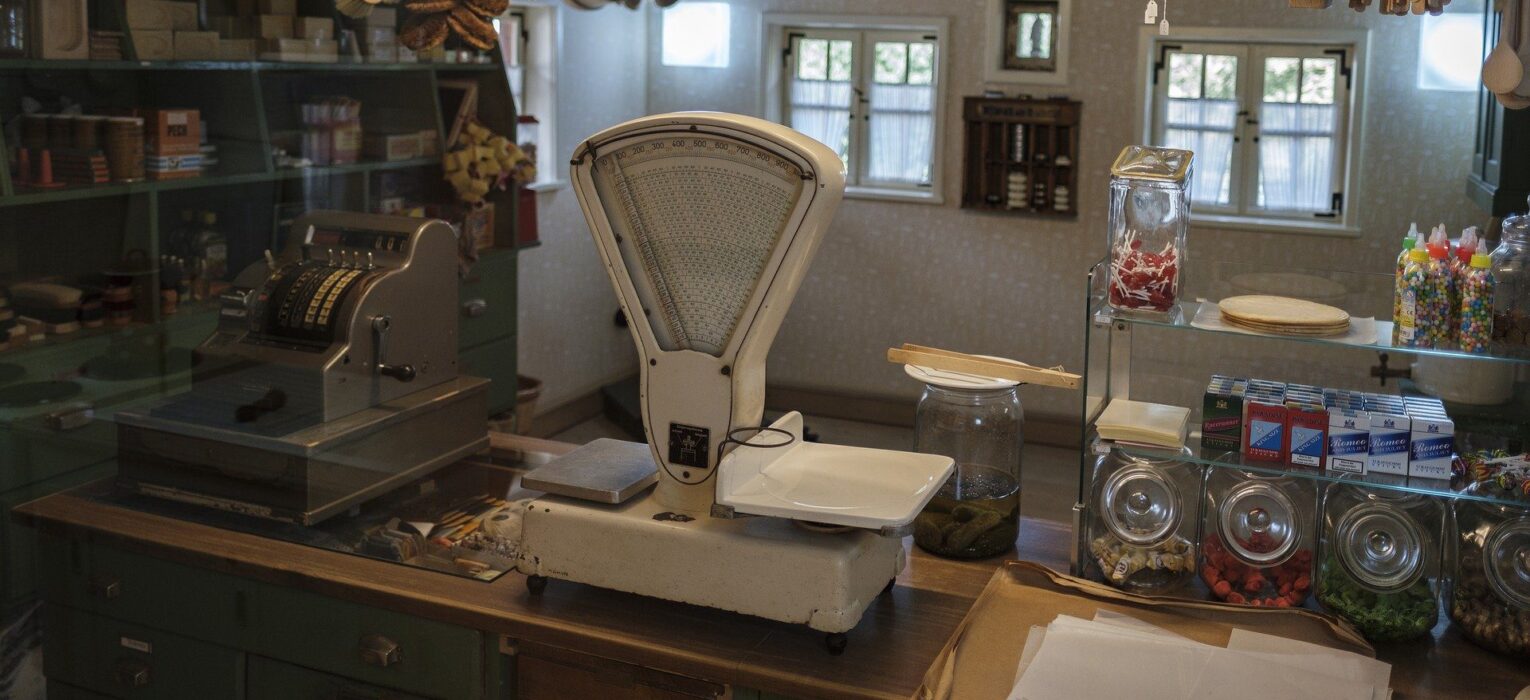SELF-SERVICE: A SHORT HISTORY OF SUPERMARKETS
When you last visited the supermarket, did you notice who was working there and what they did?
Most likely, there was someone at the cash desk who you paid. Perhaps there were some people stocking the shelves, ensuring fresh and plentiful produce to buy. Perhaps too there were people selling or serving fresh produce – a butcher, fishmonger or baker?
There was once a time, when grocery shopping, that customers asked shopkeepers for each item to be fetched from the shelves. Many products were measured and weighed for the customer’s wishes as goods were not individually wrapped or packaged. This made shopping a slower process and, as more staff were involved, more expensive.
Supermarkets have existed in Europe since the 1950s. In the early half of the 20th century, various self-service store models began emerging in the United States, which in turn moved to Europe.
Tesco in the United Kingdom, Delhaize in Belgium, Carrefour in France and Spar from the Netherlands are among the early examples. Existing organisations changed their store models to self-service supermarkets.
As consumer-culture and car ownership grew through the 1950s and 1960s, so too did the model of supermarkets – increasingly to larger self-service all-purpose super-stores that shoppers drive to on the edges of towns and cities.
Today, supermarkets are arguably the main way we do our grocery shopping in Europe.
Supermarkets gave us more freedom, allowing us customers to choose our products and, by and large, keep these private without the whole store hearing our choices.
Increasingly, stores offer services beyond groceries: for example, banking, post offices, alcohol sales, clothing.
Supermarket brands have become multinational brands operating in many countries. This has led to criticism of supermarkets as a business model. Their interactions with suppliers, the necessity to have additional packaging as well as their food waste from their product distribution models can be questioned from environmental and ethical standpoints.
In supermarkets, we find lots of regional variety and differences. Many of us know the feeling of ‘exploring’ a supermarket in a foreign country – finding new products and brands we’ve never seen before. And also discovering familiar similarities – brands sold across several European countries.
Next time you are grocery shopping, perhaps you’ll remember this blog. For while we tend to think of culture as being about great works of art, hopefully this shows that cultural heritage can be found in everyday places such as the supermarket.
Autor: Adrian Murphy. Źródło artykułu: Europeana Foundation. Licencja CC BY-SA 4.0.
Definicje i przykłady zdań pochodzą ze słownika Cambridge Dictionary.
VOCABULARY
ensure /ɪnˈʃɔːr/ – to make something certain to happen;
zapewniać, gwarantować
plentiful /ˈplen.tɪ.fəl/ – if something is plentiful, there is a lot of it available;
obfity
fetch sth/sb /fetʃ/ – to go to another place to get something or someone and bring it, him, or her back;
przynosić, odbierać coś / kogoś
emerge /ɪˈmɜːdʒ/ – to appear by coming out of something or out from behind something;
wyłaniać, rozwijać się
ownership /ˈəʊ.nə.ʃɪp/ – the fact that you own something;
posiadanie, własność
increasingly /ɪnˈkriː.sɪŋ.li/ – more and more;
rosnąco, wzrastająco
arguably /ˈɑːɡ.ju.ə.bli/ – used when stating an opinion or belief that you think can be shown to be true;
prawdopodobnie, zapewne
by and large /baɪ ænd lɑːʤ/ – when everything about a situation is considered together, generally;
w zasadzie, generalnie
supplier /səˈplaɪ.ər/ – a company, person, etc. that provides things that people want or need, especially over a long period of time; suppliers (plural) – a company that sells something;
dostawca
distribution /ˌdɪs.trɪˈbjuː.ʃən/ – the process of giving things out to several people, or spreading or supplying something;
rozprowadzenie, dystrybucja
question /ˈkwes.tʃən/ – to express doubts about the value or truth of something;
podważać, kwestionować
heritage /ˈher.ɪ.tɪdʒ/ – features belonging to the culture of a particular society, such as traditions, languages, or buildings, that were created in the past and still have historical importance;
dziedzictwo, spuścizna
variety /vəˈraɪ.ə.ti/ – many different types of things or people;
różnorodność
similarity /ˌsɪm.ɪˈlær.ə.ti/ – the fact that people or things look or are the same;
podobieństwo
tend /tend/ – to be likely to behave in a particular way or have a particular characteristic;
mieć tendencję do
standpoint /ˈstænd.pɔɪnt/ – a set of beliefs and ideas from which opinions and decisions are formed;
punkt widzenia




